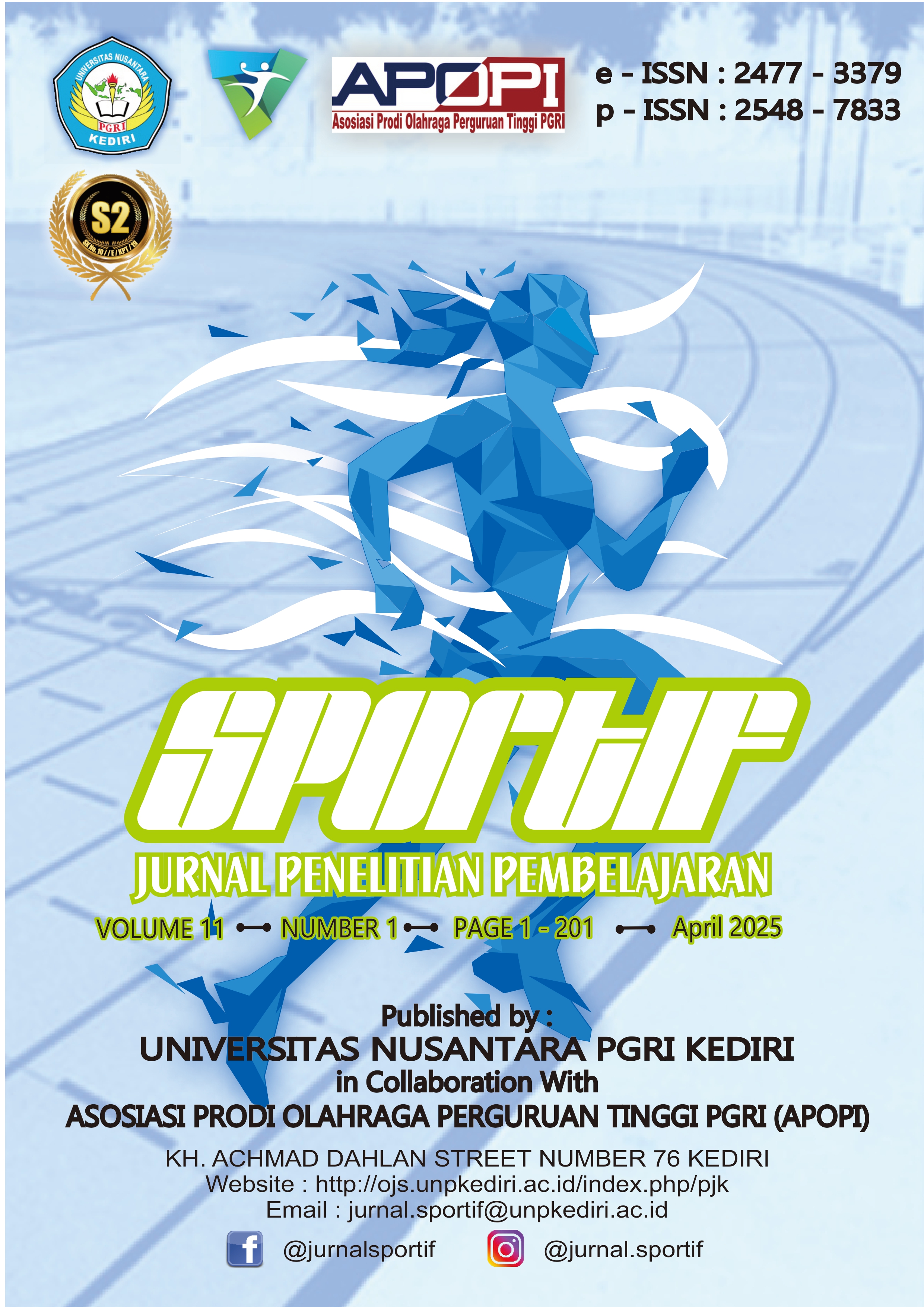Abstract
Bima Regency has not yet established a sports tourism village incorporating local wisdom. So, the study aims to develop village tours as tourist sports based on local wisdom to increase the public economy. Research is a type of research and development that uses the ADDIE development model. The sample for this study was Lambu Tourism Village, which was chosen for its potential scenic attractions. The study subjects consisted of two expert validators in sports tourism, two expert validators in general tourism, and visitors to the tourist site who served as trial respondents. This research instrument used a validation questionnaire given to expert validators and a feedback questionnaire to visitors to tourist attractions. The data analysis methods employed included quantitative descriptive analysis for assessing needs, expert validation of the product based on average scoring, and product feasibility testing measured by the percentage of community acceptance. The results of the validation of material experts from 2 validators, namely sports tourism attraction experts, validate sports tourism attractions, so the result is an average score of 89.5%, which shows that the sports tourism material is very feasible. Furthermore, expert validation is carried out with 2 validators, namely experts in the field of tourism, to validate sports tourism villages so that the validation results with an average score of 80.5% indicate that it is very feasible. So, this research is a novelty of a local wisdom-based sports tourism village that can improve the economy of local communities in Bima Regency.
References
Belias, D., Velissariou, E., Kyriakou, D., Vasiliadis, L., Aspridis, G., Mantas, C., Roditis, A., & Koustelios, A. (2018). Greece as a sports tourism destination. Innovative Approaches to Tourism and Leisure: Fourth International Conference IACuDiT, Athens 2017, 507–519. https://doi.org/10.13140/RG.2.2.30533.86242
Carneiro, M. J., Breda, Z., & Cordeiro, C. (2018). Sports tourism development and destination sustainability: the case of the coastal area of the Aveiro region, Portugal. In Sport Tourism and Sustainable Destinations (pp. 143–172). Routledge. https://doi.org/10.4324/9781351213707
Chang, M.-X., Choong, Y.-O., Ng, L.-P., & Seow, A.-N. (2022). The importance of support for sport tourism development among local residents: the mediating role of the perceived impacts of sport tourism. Leisure Studies, 41(3), 420–436. https://doi.org/10.1080/02614367.2021.2011950
Cho, H., Joo, D., & Chi, C. G. (2019). Examining nostalgia in sport tourism : The case of US college football fans. Tourism Management Perspectives, 29(November 2018), 97–104. https://doi.org/10.1016/j.tmp.2018.11.002
Da Mendez, M. R., Onang, Y., & Sujila, K. (2025). Strategi Sinergi dan Inovasi untuk Pariwisata Berkelanjutan di Desa Wisata Lewomada, Kecamatan Talibura, Kabupaten Sikka. Jurnal Nirta: Studi Inovasi, 5(1), 10–25. https://doi.org/10.61412/jnsi.v5i2.165
Dong, E., Fu, B., Li, Y., Jin, J., Hu, H., Ma, Y., Zhang, Z., Xu, Q., & Cheng, Z. (2022). Hainan sport tourism development—a SWOT analysis. Sustainability, 14(19), 12653. https://doi.org/10.3390/su141912653
Gibson, H. (2017). Sports tourism and theory and other developments: Some reflections. Journal of Sport & Tourism, 21(2), 153–158. https://doi.org/10.1080/14775085.2017.1319514
Gozalova, M., Shchikanov, A., Vernigor, A., & Bagdasarian, V. (2014). Sports tourism. Polish Journal of Sport and Tourism, 21(2), 92–96. https://doi.org/10.2478/pjst-2014-0009
Higham, J. E. S. (2020). Sport tourism: a perspective article. Tourism Review. https://doi.org/10.1108/TR-10-2019-0424
Hritz, N., & Ross, C. (2010). The perceived impacts of sport tourism: An urban host community perspective. Journal of Sport Management, 24(2), 119–138. https://doi.org/10.1123/jsm.24.2.119
Kim, W., Jun, H. M., Walker, M., & Drane, D. (2015). Evaluating the perceived social impacts of hosting large-scale sport tourism events: Scale development and validation. Tourism Management, 48, 21–32. https://doi.org/10.1016/j.tourman.2014.10.015
Mascarenhas, M., Pereira, E., Rosado, A., & Martins, R. (2021). How has science highlighted sports tourism in recent investigation on sports’ environmental sustainability? A systematic review. Journal of Sport & Tourism, 25(1), 42–65. https://doi.org/10.1080/14775085.2021.1883461
Mollah, M. R. A., Cuskelly, G., & Hill, B. (2021). Sport tourism collaboration: A systematic quantitative literature review. Journal of Sport & Tourism, 25(1), 3–25. https://doi.org/10.1080/14775085.2021.1877563
Moradi, E., Ehsani, M., Saffari, M., & Hosseini, R. N. S. (2022). Developing an integrated model for the competitiveness of sports tourism destinations. Journal of Destination Marketing & Management, 26, 100743. https://doi.org/10.1016/j.jdmm.2022.100743
Nasseef, M. A., Alshayeb, H., Ojilat, J., & Alshafiee, M. (2017). The effect of sport tourism management on support for tourism development. Journal of Management and Strategy, 8(3), 20–34. https://doi.org/10.5430/jms.v8n3p20
Satriawan, R., Furkan, F., Irawan, E., Mulyadi, M., & Anhar, A. (2024). Analisis Komponen Daya Tarik Desa Wisata Olahraga. JURNAL PENDIDIKAN OLAHRAGA, 14(1), 25–30. https://doi.org/10.37630/jpo.v14i1.1728
Satriawan, R., Zulharman, Z., & Noeryoko, M. (2024). PENGELOLAAN OBJEK WISATA OLAHRAGA BERBASIS KEARIFAN LOKAL UNTUK MENINGKATKAN KUNJUNGAN WISATAWAN. JMM (Jurnal Masyarakat Mandiri), 8(3), 2637–2648. https://doi.org/10.31764/jmm.v8i3.22723
Siyabulela, N. (2016). Using sport tourism events as a catalyst for tourism development in the Eastern Cape Province, South Africa. African Journal of Hospitality, Tourism and Leisure, 5(3), 1–12. https://www.ajhtl.com/2016.html
Slak Valek, N., Shaw, M., & Bednarik, J. (2014). Socio-demographic characteristics affecting sport tourism choices: A structural model. Acta Gymnica, 44(1), 57. https://doi.org/10.5507/ag.2014.006
Sugiyono. (2019). Metodologi Penelitian Kuantitatif dan Kualitatif Dan R&D. Alfabeta.
Swart, K., Tichaawa, T. M., Othy, J.-D. O., & Daniels, T. (2018). Stakeholder perspectives of sport tourism development in Gabon: A case study of the Africa Cup of Nations. EuroEconomica, 37(2), 177–189.
Taleghani, G. R., & Ghafary, A. (2014). Providing a management model for the development of sports tourism. Procedia-Social and Behavioral Sciences, 120, 289–298. https://doi.org/10.1016/j.sbspro.2014.02.106
Theodoropoulou, I., & Alos, J. (2020). Expect amazing! Branding Qatar as a sports tourism destination. Visual Communication, 19(1), 13–43. https://doi.org/10.1177/1470357218775005
Yfantidou, G., Spyridopoulou, E., Kouthouris, C., Balaska, P., Matarazzo, M., & Costa, G. (2017). The future of sustainable tourism development for the Greek enterprises that provide sport tourism. Tourism Economics, 23(5), 1155–1162. https://doi.org/10.1177/1354816616686415

This work is licensed under a Creative Commons Attribution-ShareAlike 4.0 International License.
Copyright (c) 2025 Rabwan Satriawan, Ewan Irawan, Ainun Fitriani, Ermawan Susanto, Slamet Santoso






